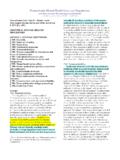Transcription of Mission for Establishment of Human Rights in Iran …
1 Mission for Establishment of Human Rights in Iran (MEHR IRAN). Box 2037, , CA 90274. Tel: (310) 377-4590 ; Fax: (310) 377-3103. E-Mail: ; URL: Islamic Penal Code of Iran The Islamic Penal Law was approved by the Islamic Consultancy Parliament on 30 July 1991 and ratified by the High Expediency Council on 28 November 1991. The Book Five of the Penal Code Ta'azirat has been ratified in May 22 of 1996. Book 1: General Concepts Part 1:General principles Part 2: Punishments Part 3: Offenses Part 4: Limitations on responsibility for offe nses Book 2: Haads [punishments specified in Shari'a].
2 Part 1: Punishment for Adultery Part 2: Punishment for Sodomy Part 3: Lesbianism Part 4: Punishment for Pimping Part 5: Sexual Malicious Accusations Part 6: Punishment for Intoxication Part 7: Punishme nt for Civil Unrest Part 8: Punishment for Theft Book 3: Ghesas [Retaliated Punishments]. Part 1: Retaliated Punishments as Dead Penalty Part 2: Retaliated Punishments to Body Organs Book 4: Diyat [Blood Money]. Part 1: Definition of Blood Money Part 2: Blood money for Murder Part 3: Timeline for Paying the Blood Money Part 4: Liability for Blood Money Part 5: ? Part 6: Participation in a Crime 1.
3 Part 7: Causing a Crime Part 8: Causing and Participating in a Crime Part 9: Blood Money for Body Organs Part 10: Blood Money for Injuries Part 12: Blood Money for Abortion Part 13: Blood Money for Crimes Committed to Human Corps Book 5: Ta'azirat [Punishments NOT Specified in Shari'a] & Deterrent Punishments Chapter 1: Crimes against National Security Chapter 2: Insulting the Religious Sanctities or State Officials Chapter 3: Insulting or Attempting at Foreign State Officials Chapter 4: Producing False Money Chapter 5: Forgery and Fraud Chapter 6: Breaking Official Stamps Chapter 7: Escaping from Prison Chapter 8: Usurpation Chapter 9: Damaging Historical Properties Chapter 10: Wrongdoing of State Officials Chapter 11: Usury and Bribery Chapter 12: ?
4 Chapter 13: Disobedience of State Officials Chapter 14: Attacks on State Officials Chapter 15: Personal Insults Chapter 16: Compliance in a Crime Chapter 17: Offenses against people and children Chapter 18: Offenses against Public Moral Chapter 19: Offenses against Family Duties Chapter 20: Lying under oath Chapter 21: Theft Chapter 22: Threatening Chapter 23: Bankruptcy Chapter 24: Violation of Consignment Chapter 25: Incineration and Damaging Properties or Animal Chapter 26: Violating real estates and other properties Chapter 27: Libels and Revilements Chapter 28: Intoxication, Gambling, and Vandalism Chapter 29: Violating Traffic Rules Book 1: General Concepts Part 1:General principles Part 2: Punishments Chapter 1: Types of Punishments Article 12: There are five types of punishments: a) haad; b) ghesas; c) diyat; d) ta'azirat, e) deterrent punishments.
5 2. Article 13: haad is a punishment that its degree and type is not been specified in the Shari'a. Article 14: Ghesas is a punishment that should be equal to the crime. ( retaliated punishment). Article 15: Diye is a financial punishment [ Blood Money ] that is sentenced by a jud ge. Article 16: Ta'azir is a punishment that its degree and type is not been specified in the Shari'a and it is up to the decision of the judge. Ta'azir can be in the form of imprisonment, fines, or flogging (it should be less than haad). Article 17: Deterrent punishment is a punishment that is imposed by the government in order to maintain the public order.
6 It can be in the form of imprisonment, fines, or flogging (it should be less than haad). Part 3: Offenses Part 4: Limitations on responsibility for offenses Book 2: Haads [punishments specified in Shari'a]. Part 1: Punishment for Adultery Chapter 1: Definition of Adultery Article 63: Adultery is the act of intercourse, including anal intercourse, between a man and a woman who are forbidden to each other, unless the act is committed unwittingly. Article 64: Adultery shall be punishable (subject to hadd) when the adulterer or the adulteress is of age, sane, in control of his or her action and cognizant of the illicit nature of his or her act.
7 Article 65: Only the adulterer or the adulteress who is cognizant of the illicit nature of his or her act shall be punished for adultery. Article 66: If either the adulterer or the adulteress claims ignorance of law or fact, he or she shall not be punished for adultery if his or her claim is presumed to have prima facie validity, even if no witnesses to verify said claim are produced. Article 67: If either the adulterer or the adulteress claims to have been under duress while committing the act of adultery, he or she shall not be punished if his or her claim is not otherwise clearly disproved.
8 Chapter 2: Ways to Prove Adultery in Court Article 68: If a man or a woman repeats his or her confession of adultery four lashes before the judge, he or she shall receive the designated punishment, but if he or she repeats his or her confession fewer than four lashes, the punishment shall be at the judge's discretion. 3. Article 73: Pregnancy of an unmarried woman shall not by itself be the cause of punishment unless relevant evidence, as defined in this code, proves that she has committed the act of adultery. Article 74: Adultery, whether punishable by flogging or stoning, may be proven by the testimony of four just men or that of three just men and two just women.
9 Article 75: If adultery is punishable only by flogging it can be proven by the testimony of two just men and four just women. Article 76: The testimony of women alone or in conjunction with the testimony of only one just man shall not prove adultery but it shall constitute false accusation which is a punishable act. Article 81: If the adulterer or the adulteress repents prior to confessing to the act of adultery, he or she shall not be punished (subject to hadd). If, however, he or she repents following his or her confession the punishment for adultery shall apply. Chapter 3: Types of Punishments for Adultery Article 82: The penalty for adultery in the following cases shall be death, regardless of the age or marital status of the culprit: (1) Adultery with one's consanguineous relatives (close blood relatives forbidden to each other by religious law); (2) Adultery with one's stepmother in which the adulterer's punishment shall be death; (3).
10 Adultery between a non-Muslim man and a Muslim woman, in which case the adulterer (non-Muslim man). shall receive the death penalty; (4) Forcible rape, in which case the rapist shall receive the death penalty. Article 83: Adultery in the following cases shall be punishable by stoning: (1) Adultery by a married man who is wedded to a permanent wife with whom he has had intercourse and may have intercourse when he so desires;. (2) Adultery of a married woman with an adult man provided the woman is permanently married and has had intercourse with her husband and is able to do so again.


